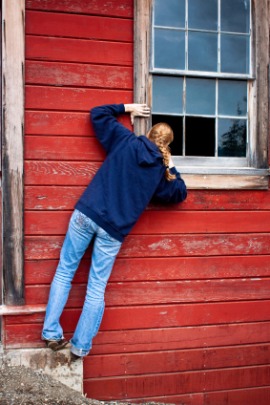and yes, I'm still planning to get back to some of the things I said I'd pick up from the Monday and Tuesday sessions too...(not until after I get back from tomorrow's African Drumming workshop though!!!)
So, both the afternoon and evening sessions I went to yesterday had the word "interesting" in the title or subtitle. The premise of both is, essentially, that everyone is interesting, we just need to know how to draw that out of people and how to showcase it in ourselves (but without constantly "pitching" ourselves--this is not about selling yourself, it's about building relationships and conveying stories). In a world all about status updates and 140 character tweets, this is harder than it sounds!
In the first, we learned some of the techniques that Me So Far uses to get people to open up and share things about themselves that you probably wouldn't learn in your average first date. In the second, we heard from Public Radio hosts and reporters both about how to get people to share and how to convey your own interest.
So, at Me So Far we were asked to think about answers to a series of questions that really offer you a variety of ways to answer. You can go for the deep or the shallow option, you can show visuals or just offer the words, you can let your sense of humor shine through or you can convey really serious stuff...all in answer to questions you've probably never been asked. For example:
- What is something you would tell your 18 year old self?
- Show us the last picture taken on your phone.
- What is a number of significance in your life, and why?
- If you could create a convention on the topic of your choice, it would be...
- Who, outside your family, has had the most significant impact on your life?
- What is something you haven't figured out yet?
I think this is where the Public Radio lab then really comes into play. The host and reporter talked with us about how to be interesting, and in their whole hour said very little about what we might actually say. Instead they talked a lot about how we listen. One of the phrases they used was that we need to "listen relentlessly."
Listen Relentlessly. I love that.
How often are we listening only for the piece of information to which we can relate, so we can then do the talking? Or for the thing with which we disagree, so we can argue? Or not listening at all, because we're busy thinking about brunch or the Bears game or the laundry or work or why my phone is buzzing in my pocket?
They also reminded us not to ask "verb-leading questions"--those questions that start with a verb (did/do/are/will/etc) are almost always closed questions, they really only require a yes or no. Instead go for the standbys we all know: who/what/where/when/how/why. These open ended questions offer opportunity for people to share, rather than simply conveying information. But then you have to practice relentless listening, because it's more work to pay attention to the answer to these questions than to yes-or-no questions. (You'll notice all those Me So Far questions were these open ended discussion starters, not the usual "do you like it?" kind of things. Again, what kind of questions are we asking when we come to Bible study? Worship? Meetings? Fellowship? Classes? Hospital rooms? Community organizations?)
Which leads to another piece of advice from the pros--allow the silence. Don't fill it with another question or prompt or anything at all--not even a verbal encouragement, though body-language-encouragement is good. Just let the silence be there, and often people will continue elaborating or telling something new. You would think in church we would be good at this, but no--we are just as terrified of silence as the average American who has their 3 devices going at the same time. But silence can open up new worlds--and these are the RADIO people telling us to let the silence hang for a bit! If anyone should be concerned about dead air, it's them, and yet...
They also said that everyone should read widely--Steve Edwards gets the New Yorker and the Economist and Us Weekly. You never know what might be applicable to your job, your conversation, your relationships, your life--so read widely, pay attention, and be ready to see connections where others might not. Interestingly, this is exactly why I've been at Ideas Week, even though I haven't been to anything directly church related. Because of the cross-pollination, the expanding of ideas, the possibilities, the connections that don't seem obvious but are still there...
And then there's this little gem: in talking about how difficult it had been to get certain people to speak up and tell their stories, they mentioned the difference between radio and print media. In order to run a radio story, you've got to have good tape. In print, a reporter can take what they've learned, synthesize it, and write it up in his/her own voice. On radio, the story only works if its own voice can be heard. You have to find ways for the story to be heard, not to tell it in your own words. The applications of this to preaching, teaching, and pastoral care are astounding. You would think we would all have learned this by now, but we need to keep re-learning--our job as preachers is to let the story's voice be heard. How can we work to get "good tape" rather than always resorting to just telling it in our own words?
(the studio tour? the hanging out with public radio staff? the chatting about possible future events? Also incredibly awesome.)



